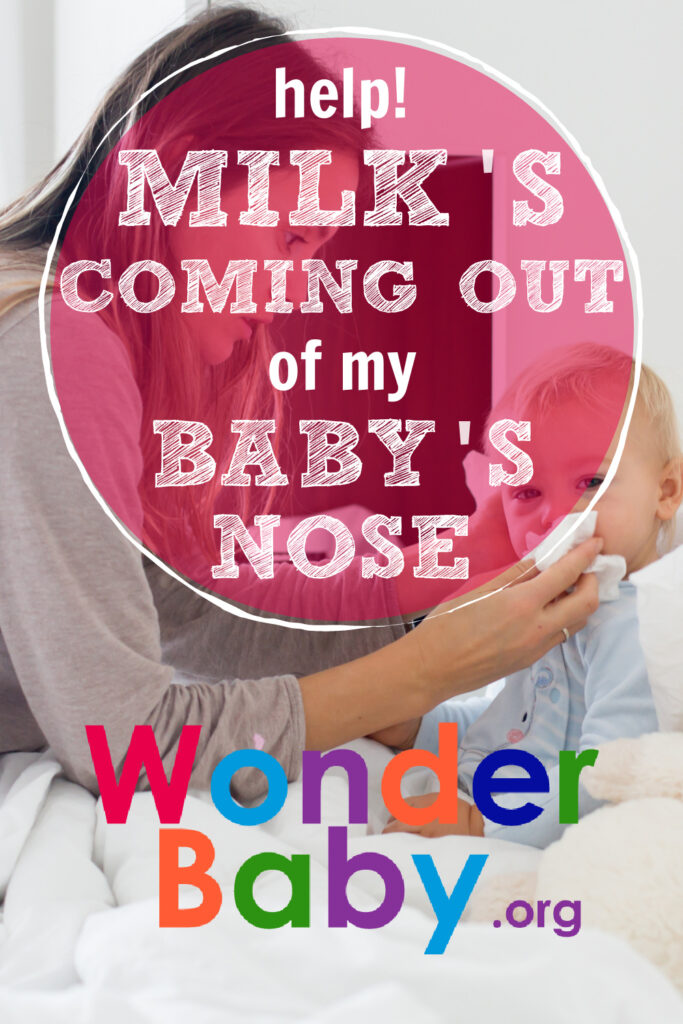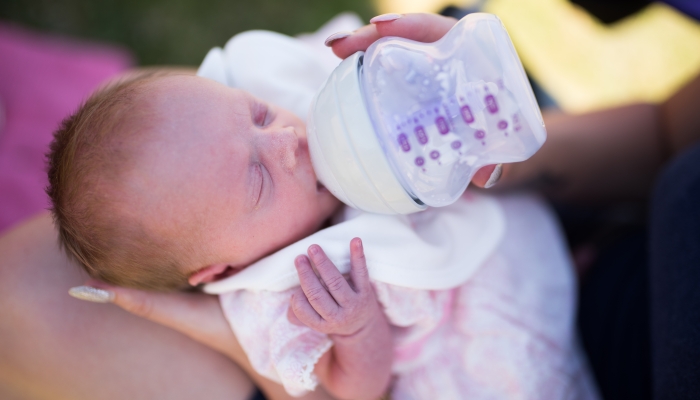Help! Milk is Coming Out Of My Baby’s Nose!

- Milk coming out of baby’s nose is normal and is called nasal regurgitation.
- Nasal regurgitation is usually no different from regular spit-up—it’s just taken a slightly different route.
- Speak to a doctor if it doesn’t look like milk, is a strange color like yellow or green, or contains blood.
Before becoming a parent you were probably warned to buy lots of burp cloths and to have one draped over your shoulder after every feed. What you might not have been prepared for is a stream of milk running out of your baby’s nose. Although this can be surprising and sometimes terrifying, it’s most often a perfectly normal part of being a baby.
Milk coming out of baby’s nose won’t usually bother your baby and is unlikely to have any side effects beyond extra laundry. However, if it’s becoming a problem, there are things you can do to reduce it. There are also some warning signs to look out for, as some cases of nasal regurgitation may require a trip to the pediatrician.
Why Does Milk Come Out of My Baby’s Nose?
Since your baby’s mouth and nasal passages are connected, sometimes spit-up that was headed for their mouth takes a detour and comes out of their nose instead. So, the reasons for nasal regurgitation are mostly the same as those for the classic, burp cloth over the shoulder, baby spit-up. These can include common feeding issues, an immature stomach valve, allergies, coughing and sneezing, or a cleft palate.
Taking in too Much Air While Feeding
If your baby is really hungry for a feed they might drink too quickly or start swallowing with an incorrect latch. This will cause them to swallow air at the same time as their milk. As the bubbles try to escape, the milk comes with it, leading to spit-up.
Overfeeding
If your baby just loves their milk, they might ignore the signs that they’re full and keep drinking. When your baby’s stomach becomes too full, it’ll literally overflow and milk will come up through their mouth and nose.
Distracted Feeding
Sometimes babies get distracted during feeding and forget to swallow. When their mouth gets too full they’ll suddenly choke on the milk and it might flow out of their nose.
Immature Stomach Valve
Often, when babies are first born, the flap between their stomach and esophagus, called the lower esophageal sphincter muscle, isn’t fully developed. This makes it easy for milk to flow up, out through the esophagus, and into their nose.
Allergies
Rarely, your baby’s reflux could be caused by allergies. If they seem to be constantly spitting up, are struggling to gain weight, or seem to be in a lot of discomfort after a feed, it might be worth seeking professional medical advice about a potential cow’s milk allergy. This can affect breastfed babies as well as those who are formula-fed, as the cow’s milk proteins can make it into the breast milk if they’re included in the mom’s diet.
Coughing or Sneezing While Spitting Up
Your baby may have just been unlucky and happened to cough or sneeze at the same time as spitting up. This forces the milk out of their nose.
Cleft Palate
Very rarely, nasal regurgitation can be caused by a submucous cleft palate. Having a cleft palate means the tissues making up the roof of the mouth haven’t joined completely during pregnancy. Submucous cleft palates aren’t always immediately obvious in a newborn baby and are often diagnosed late. Contact your baby’s pediatrician if milk comes from their nose after every feed.

Is Milk Coming Out of My Baby’s Nose Normal?
Regurgitation of milk or gastroesophageal reflux is common, affecting 67% of all four-month-olds. It can be scary to witness, especially as your baby might be shocked and struggle to breathe until the milk is cleared, but it has no long-term side effects. spit-up from the nose is no more of a worry than spit-up from the mouth.
What to Do When Milk Comes Out of Your Baby’s Nose
When your baby spits up, they’ll look to you for cues for how to react. So stay calm and smiley as you clean them up. Be as gentle as possible—you don’t want to create a negative association with feeding. For example, a soft cloth will be more pleasant on your baby’s face than a cold, wet baby wipe.
If your baby is upset by spitting up, a cuddle and some skin to skin contact is a great way to calm them down, and you’ll probably need to change your shirt anyway.
How to Prevent or Reduce Spit-Ups
Spitting up is completely normal, but there are a few things you could try that might reduce or even stop your baby spitting up.
- Burping – Burp your baby in the middle and at the end of a feed. This will help them release any trapped air before too much builds up in their tummy.
- Avoid Overfeeding – Try not to give more milk than your baby can handle in a single feed. You could try feeding smaller amounts more often or offer a pacifier at the end of a feed if they’ve had enough but seem to want to keep sucking for comfort.
- Upright Feeding Positions – Experiment with different positions that allow you to keep your baby upright during feeds and for a few minutes afterward.
- Pacifiers – If your baby falls asleep while feeding, the suck swallow reflex can lead to them taking in too much milk. To avoid waking them, quickly swap the bottle or breast for a pacifier.
- Slow Flow Bottles – If you’re bottle feeding your baby, try switching to a bottle teat with a smaller hole. This will stop milk from flowing so quickly and prevent your baby from swallowing air.
- Check the Latch – When breastfeeding, make sure your baby’s lips are turned outward like a fish, and none of the areola is visible. You should be able to see their ears moving as they suck, which shows that they have enough of the breast in their mouth and won’t ingest air.
- Distraction-free Feeds – If you think distractions might be the culprit, try feeding your baby in a quiet room where you won’t be interrupted.
- Loose Clothing – Make sure your baby’s clothes and diaper aren’t too small. Tight clothing will put too much pressure on their tummy. You might need to go up a diaper size, but make sure it’s still secure. You don’t want to be swapping spit-ups for diaper explosions.
- Tummy Time – Avoid putting pressure on your baby’s stomach by delaying tummy time until your baby has had a chance to digest their milk or formula.
- Avoiding Cow’s Milk and Other Allergens – If you’re breastfeeding your baby, monitor your diet to see if it has any impact on their number of spit-ups. Bottle fed babies may need a special formula that’s had the proteins broken down. Always check with your doctor before making any changes to your diet or baby’s diet.

When Do Babies Stop Spitting Up?
Rest assured, this messy baby phase doesn’t last too long, and spitting up and nasal regurgitation should start to decrease around 6 months. Most babies outgrow reflux between 7 months and a year old. By this age they’ll be spending more time in an upright position, their digestive system and stomach valve will be more developed, and they’ll have started eating solid food.
How Can I Tell if the Milk Coming out of Baby’s Nose is Spit-Up or Vomit?
Babies’ spit-up looks just like breast milk or formula and usually flows out fairly gently without causing too much distress.Vomit, on the other hand, is forcefully expelled by their stomach muscles contracting, so it will come out faster and there’s often more of it. Vomiting is usually caused by a stomach bug or motion sickness.
It may not be spit-up if it:
- Comes from their nose and mouth at the same time.
- Comes out as projectile or as a spray.
- Contains their whole stomach contents, not just ingested milk.
- Causes discomfort or distress for your baby.
When to Call a Doctor
Rarely, babies can develop severe gastroesophageal reflux disease, acid reflux or an intestinal blockage in their digestive system that will require professional medical assistance. Call a doctor immediately if:
- You notice milk coming from your baby’s nose after every feed.
- Your baby isn’t gaining weight or is losing weight.
- Their spit-up is yellow or green.
- Your baby’s spit-up contains food or even blood.
- Your baby arches their back and neck after feeds (some babies do this to avoid pain associated with reflux).
- Your baby often seems uncomfortable or distressed after a feed, or they show frequent gagging, choking, burping or hiccuping, or bad breath.
- They’re refusing to feed or cry every time they spit-up.
- They’re still frequently spitting up after their first birthday.
- Your baby has difficulty breathing. If their face or lips change color, go to the emergency room or call 911.
Should I Try a Different Sleeping Position for My Baby to Reduce Spit-up?
No, your baby should always be placed on their back to sleep. This is one of the most important things you can do to prevent sudden infant death syndrome (SIDS).

The information WonderBaby provides is not intended to be, and does not constitute, medical or other health advice or diagnosis and should not be used as such. Always consult with a qualified medical professional about your specific circumstances.
Related Posts

Feeding and Eating, Special Needs
Feeding Therapy Approaches for Infants with Special Needs
Many children with special needs have feeding difficulties. Working with a speech therapist, being patient, and experimenting with textures can help.

Feeding and Eating
Unexpected Foods That Cause Allergen Cross-Reactivity
A variety of unexpected foods and environmental substances can trigger an allergic reaction through cross-reactivity to food proteins.

Feeding and Eating
Easing Anxiety for Families Facing Food Allergies
Ongoing physical preparations and speaking openly about anxiety can ease the transition from diagnosis to living well with a food allergy.